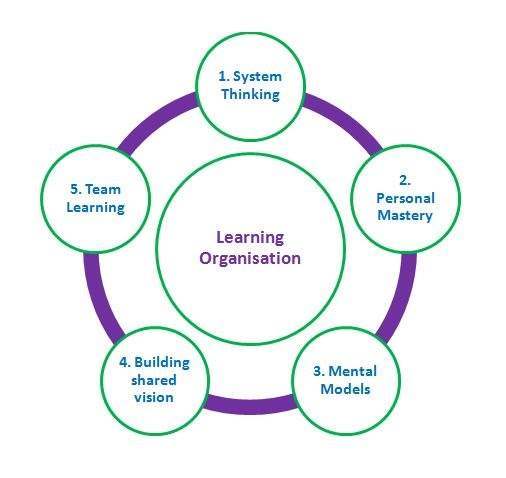1.2 Learning Organizations
1.2 Learning Organizations
Besides the obvious importance of having instructors that can function successfully in their roles, learning is critical to the development and growth of your programs. Learning organizations are ones in which the values and behaviours emphasize continuous learning for all employees.
Learning organizations are said to have the following five disciplines, as seen in the model below.
 (A Modern Way to Work, 2019)
(A Modern Way to Work, 2019)The following is how these principles relate to your programs and what you can do to foster a learning organization:
1. System Thinking; program directors and instructors analyze and are curious about how individual events impact other situations. In a learning organization, problems are solved through understanding broader impacts to get to the root cause and effect.
- To help foster this principle - work with instructors to help problem solve, encourage people to think of pros/cons of solutions as well as how they might affect others and other processes of the program.
2. Personal Mastery; individuals (instructors or program directors) have a clear sense of what they would like to achieve from a goal-oriented perspective and develop skills and insights necessary to achieve those goals.
- To help foster this principle - use the performance management process to better understand instructors’ goals, keep these in mind as you deliver feedback and development throughout the program.
3. Mental Models; employees generally share best practices and a set of values that help them problem solve.
- To help foster this principle - continuously explain why decisions are being made a certain way, and support others in explaining the models they used to arrive at key decisions.
4. Building a Shared Vision; learning organizations have a common goal they are working towards. Within your programs this should feel straightforward and evident.
- To help foster this principle - use opportunities like performance feedback, orientation, and group meetings to remind people of the bigger reason you are all there.
5. Team Learning; this is where personal goals meet a shared vision. Instructors must feel safe and comfortable to raise problems, suspend judgment and work together to support one another and share failures.
- To help foster this principle - use team meetings to celebrate how a failure or difficult situation turned into a positive learning moment. Share your own learning as the program director with others and encourage the people around you to do the same.
Activity: Watch the Video
If you’re interested in learning more about how to cultivate learning organizations, the following video explores the above principles using different language and further examples.
Watch the Video: The Learning Organization
Training and Development
- Getting Started
- 1.1 Introduction
- 1.2 Learning Organizations
- 1.3 Types of Learning
- 1.4 Differences between Training
- 1.5 The Adult Learner
- 1.6 Different Learning Types
- 1.7 Different Instructional Methods
- 2.1 Introduction
- 2.2 Needs Analysis, Learning Outcomes and Meaning
- 2.3 Developing Learning Outcomes
- 2.4 Mapping out Orientation, Onboarding, Training
- 2.5 Cost and ROI
- 2.6 Evaluation of Training Effectiveness
- Survey
- Credits, References and Resources
Viewed 3,100 times